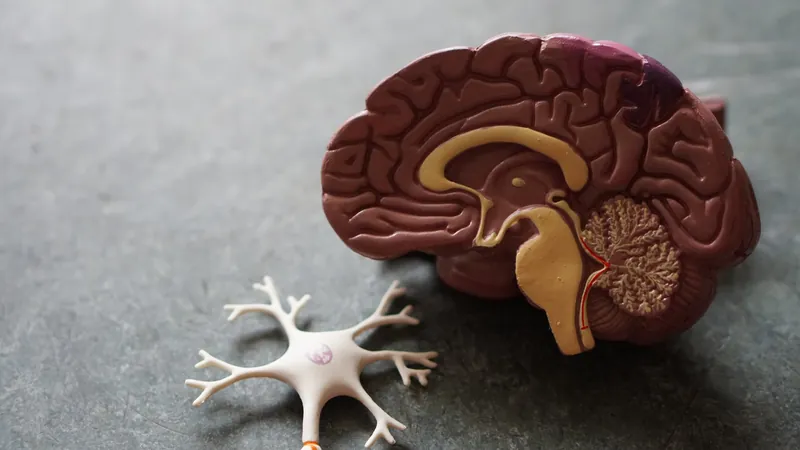
Breaking Barriers: Empowering Today’s Youth in Mental Health Conversations
2025-04-08
Author: Michael
Breaking Barriers: Empowering Today’s Youth in Mental Health Conversations
In today's rapidly evolving world, it's crucial to recognize the unique challenges faced by younger generations. As Em Alexander observes, young adults now navigate a landscape shaped by the incessant flow of digital information and global events, elements that profoundly impact their mental health. The urgency for mental health programs to engage young people's perspectives cannot be overstated; their insights are vital for creating relevant and impactful initiatives.
Colbi Mike poignantly articulates the multi-faceted struggles that youth endure, exacerbated by economic instability, mental health crises, substance use issues, and systemic racism. Indigenous youth, in particular, bear the weight of intergenerational trauma and discrimination, facing barriers that often hinder their path to healing and empowerment. At the core of this challenge is a broader societal misunderstanding of Indigenous identity and the complexities involved in cultural healing.
Young Voices Matter: Igniting Change in Mental Health Dialogues
The necessity of including youth voices in mental health rollouts cannot be ignored. Colbi emphasizes that young individuals possess unique perspectives and lived experiences that can profoundly influence the effectiveness of policies and programs designed for them. Their involvement fosters a sense of belonging, leadership, and accountability. By integrating the experiences of those who have lived through these challenges, programs can evolve to genuinely meet the needs of the younger population.
Em notes the importance of a council established in 2008 that prioritizes youth engagement, ensuring that those with first-hand experience of mental health issues are part of pivotal decision-making processes. Adopting the mantra “nothing about us without us”, it becomes clear that impactful policy-making must include input from those it aims to serve.
The Role of Lived Experience in Policymaking
It is essential to amplify the voices of individuals with lived experience, as their insights bring a layer of practicality often overlooked by professionals. Both Em and Colbi emphasize the necessity of engaging these individuals in policy discussions to create inclusive and effective mental health initiatives. For Indigenous mothers like Colbi, navigating complex support systems provides the foundation for advocacy, ensuring that emotional well-being is prioritized.
Em's role as co-chair reflects the commitment of leaders to take on a trauma-informed approach, emphasizing the intersectionality of identities and lived experiences. This perspective fosters a collaborative environment, allowing the council to operate effectively through trust and mutual respect.
Next Steps: Education, Awareness, and Funding
Education emerges as a crucial pillar in tackling these challenges. Colbi advocates for a comprehensive understanding among healthcare professionals regarding the long-term impacts of colonial policies, stressing the need for culturally informed care. Although advancements have been made in this educational integration, the pace remains sluggish, necessitating accountability for its enhancement.
Em agrees, highlighting the critical need for bolstered support within the mental health workforce. Despite growing awareness, systemic obstacles such as resource shortages, funding gaps, and accessibility issues hamper progress. Maintaining funding and resources for mental health initiatives is essential, especially through political transitions that threaten stability in these areas.
Community Support: Every Individual Counts
Both Em and Colbi stress the importance of supporting those in need. When someone reaches out, it’s vital to listen with empathy and openness—especially to marginalized communities such as BIPOC and 2SLGBTQI+ individuals, who face significant pressures and risks in today’s society. Em encourages everyone to actively check in on loved ones, noting the heightened vulnerabilities prevalent within these demographics.
Mental health intricately influences family and community well-being, making it imperative to espouse inclusivity in mental health care. Colbi points out that mothers often wrestle with stigma and social isolation, underscoring the need for accessible services that also provide childcare and transportation support.
Finally, a call for continued cultural integration in healing practices stands paramount; for Indigenous communities, reconnecting with cultural identity, language, and communal support is fundamental to resilience. Investing in these areas not only fortifies individual well-being but also celebrates and preserves heritage for future generations.
Together, we can reimagine mental health support by breaking down barriers, amplifying young voices, and fostering spaces of understanding and inclusion. Are we ready to pave the way for real change? The time to act is now!









 Brasil (PT)
Brasil (PT)
 Canada (EN)
Canada (EN)
 Chile (ES)
Chile (ES)
 Česko (CS)
Česko (CS)
 대한민국 (KO)
대한민국 (KO)
 España (ES)
España (ES)
 France (FR)
France (FR)
 Hong Kong (EN)
Hong Kong (EN)
 Italia (IT)
Italia (IT)
 日本 (JA)
日本 (JA)
 Magyarország (HU)
Magyarország (HU)
 Norge (NO)
Norge (NO)
 Polska (PL)
Polska (PL)
 Schweiz (DE)
Schweiz (DE)
 Singapore (EN)
Singapore (EN)
 Sverige (SV)
Sverige (SV)
 Suomi (FI)
Suomi (FI)
 Türkiye (TR)
Türkiye (TR)
 الإمارات العربية المتحدة (AR)
الإمارات العربية المتحدة (AR)